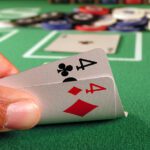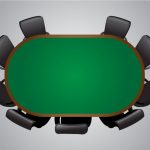After reviewing this month’s play, I came to the same conclusion I came to last month, and the month before that, and the month before that. But I have failed to act upon that conclusion. Further, many of my professional-minded friends, after reaching the exact same conclusion, have overwhelmingly failed to act upon it as well.
It is the biggest money-making secret in the poker world.
And it is at the same time the simplest, most intuitive, obvious, and overlooked concept in the game. And almost all of us are blatantly ignoring it. That’s ok. It’s not really entirely our fault.
I know you’re saying, damnit Euph, tell me what it is already. And we’ll get there, I promise. But, we’re going to Quentin Tarantino this one. Work it backward. Memento it.
So here is our first detour.
I was recently re-reading Chapter 8 of The Intelligent Investor by Benjamin Graham. This is the book Warren Buffet claims is the best investment book of all time. That’s a hell of an endorsement if you ask me. In it I came upon the concept upon the psychological effects of gain and loss in a risk-based enterprise.
The book essentially stated two facts, which we all pretty much already know:
1. To the “average” person winning $1,000 feels pretty good while losing $1,000 feels like the end of the world — even if you won the $1,000 first and are essentially net even. That is, we amplify the “emotional charge” of our losses significantly.
2. Humans are, by their very nature, adept at creating patterns where patterns don’t exist.
It then took these two facts and related them to the stock market — where the share price of a stock rules everyone’s thoughts — and stated quite pointedly that the entire investing public would be significantly better off if they never knew the precise current price of a stock that they held in their portfolio.
The reasoning, in light of the previous two stated facts, should be fairly clear. We will create a pattern where there is none, and emotionally amplify our losses and pretty much ignore our gains. Frankly, we’ll end up doing stupid things. Getting emotionally worried over insignificant losses, seeing a downward trend where there is none and screaming at the top of our lungs “SELL! SELL! SELL!” or we will see an upward trend where there is none and expect it to continue forever, spending money before we’ve earned it.
Yet how many people do you know check their stocks religiously throughout the day? Even going so far as to have them beamed to their cell-phones so they can know anywhere, anytime?
Is it doing them any good?
Instead, “The Intelligent Investor” when asked how his stocks are doing, says, “I don’t know, and I don’t care.” because he has done his research, put his money in good stocks, and will get the expected results in the long term if his methods are sound.
I’m hoping that by now you’re beginning to see the correlations to poker.
How many of us live and die by our daily results? How many of us live by up-to-the-hand results, hitting the “force import” button on PokerTracker after every hand? I know I do.
That is not Intelligent Investing.
Intelligent Investing is doing the research, perfecting your methods, probing your weaknesses, and checking your results periodically to refine the whole enterprise.
Intelligent Poker Playing is no different. Do your research, know your math, perfect your methods, probe your weaknesses, and check your results periodically to refine the whole enterprise.
Otherwise you will fall under the same spell of the guy checking his stock quotes every five minutes. Recall this statement and relate the inherent similarities:
The stock-quote-guy is … Getting emotionally worried over insignificant losses, seeing a downward trend where there is none and screaming at the top of his lungs “SELL! SELL! SELL!, or he is seeing upward trends where there are none and expecting them to continue forever, spending money before he has earned it.
Remember, poker, just like investing, is a long-run and long-term enterprise. The daily fluctuations in the market or in your bankroll are wholly insignificant, assuming your methods are sound.
Alright Euph, get to the point. I just want to know what the biggest money-making secret in the poker world is. Well I just told it to you. It’s hidden in that sentence right above. “Poker … is a long-run enterprise.”
I bet some of you are thinking, “I knew that dude. You made me read this whole thing for THAT?!” Well, if that is what you’re thinking, you’ve missed the point.
The real secret to making money in poker is speeding up the long-term process.
This is the easiest way to increase your poker profits and it takes no effort. It is so simple. You do nothing different than what you usually do. You just do a little more of it.
You just play more poker.
I didn’t make as much money this month as I wanted to because I didn’t play anywhere near enough hands. Why didn’t I play enough hands? Because I fell victim to the stock-quote syndrome.
I went up 50 bets in 200 hands and I stopped playing. And I did it several times. But then I had big corresponding losing sessions – the only difference being that I would play my full 1000 hand sessions on those days. What’s the net effect? I played fewer hands;,significantly fewer hands. And as such, I made significantly less profit.
If we look at our results the same way some people look at their stock quotes, and we put any sort of stock (no pun intended) into what those highly variant short-term results are telling us, we will certainly not be doing ourselves any favors. It is a completely and entirely negative concept.
If we are then fairly sure of our investing methods — our gameplan — our results are mathematically guaranteed to materialize if we give them enough time. In poker, this comes down to one fundamental reality you will hear repeated over and over and ignored just as often.
Your profit is a function of how many hands you play, and don’t let the human mind’s propensity to view patterns where there are none to convince you of anything else.
I’ll leave you with one semi-relevant, quick, anecdote from the Intelligent Investor book:
Boca Raton, Florida is a very wealthy community, mostly centered around the retired, and most of the people living there got there due to their involvement in the stock market. When several of these retirees were asked how their portfolio was performing in relation to the rest of the market, some knew exactly. Others had no idea, as they paid other people to manage their money.
One person said, “Who cares, I live in Boca, don’t I?”
He had a good point. It’s not about being richer or outperforming the next guy, it’s about fulfilling your goals.
Submit your review | |










